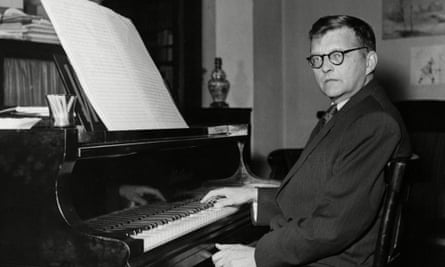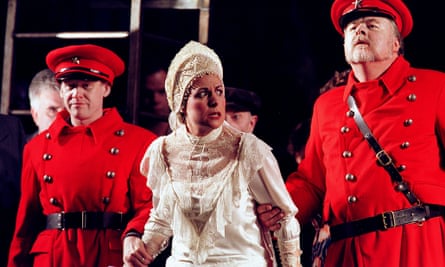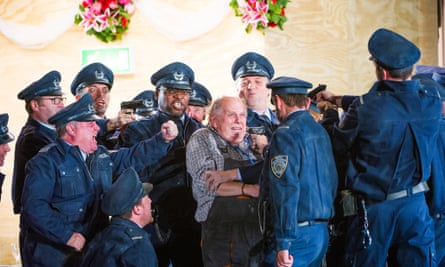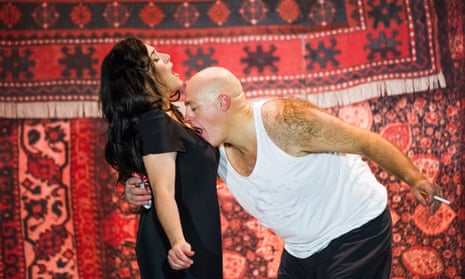Dmitri Shostakovich probably had a bad feeling already, when he picked up his copy of Pravda at Arkhangelsk station on 28 January 1936. Two evenings beforehand, in Moscow, the composer had endured a shock.
The commissar himself, Joseph Stalin, had come to hear Shostakovich’s opera Lady Macbeth of Mtsensk, which had been touring successfully for two years. Stalin did not agree with the accolades that had greeted this culmination of Shostakovich’s effervescent, avant-garde work to date; he left his seat in the Bolshoi theatre, appalled, before the final scene. Shostakovich wrote to his friend Ivan Sollertinsky: “The show went very well. I was called out by the audience and took a bow. My only regret is that I did not do so after the third act. Feeling sick at heart, I collected my briefcase and went to the station.”
Shostakovich opened the paper. “Muddle instead of music”, he read of his work – ostensibly from the hand of Stalin himself. Shostakovich’s opera was “an ugly flood of confusing sound ... a pandemonium of creaking, shrieking and crashes”. He was “trifling with difficult matters”. The article decreed that “it might end very badly”. In a time of fear, tremor and secrecy across the USSR, the verdict could not have been more terrifying.

Stalin’s article unleashed a storm of bigotry. The composers’ union condemned the opera, while fair-weather “friends” rushed to ingratiate themselves with Stalin by berating Shostakovich in a flurry of articles and speeches. Only a bold few stood by him. “As I visited Shostakovich every day, we read them together,” recalled his friend Isaak Glikman. “We reacted differently. I with disgust, irritation and sometimes indignation, whereas Dmitri Dmitreyevich remained silent and made no comments.”
But “instead of repenting”, Shostakovich later wrote to a friend, “I composed my Fourth Symphony.” This was a massive, volatile, dissonant work – and too risky to present as a sequel to Lady Macbeth after Stalin’s attack. He withdrew it, and it was not performed for 25 years, until the post-Stalinist thaw under Nikita Khrushchev.
With the Fourth shelved and the opera effectively banned, Shostakovich, in a stroke of true genius and double entendre, crafted his Fifth Symphony, famously interpreted on two levels: one by the party apparatchiks, who heard in it a return to the classical fold after the aberration of Lady Macbeth, but by the audience at its premiere – who shed tears of emotion – as a requiem for the Terror.
Lady Macbeth likewise vanished from public view, only to reappear in 1962 (a year after the Fourth Symphony) as a revised version, Katerina Izmailova. More recently, the original has taken its rightful place in the mainstream repertoire, and a new production by the English National Opera opens on Saturday 26 September, under a conductor of proven dedication to Shostakovich: Mark Wigglesworth.

Lady Macbeth derives from a fin-de-siecle novel by Nikolai Leskov about Katerina Izmailova, imprisoned in a life of barren stultification with her merchant husband until the arrival of his assistant, Sergei, with whom she falls in love. She kills her odious father-in-law and, suddenly unafraid, her husband too. The lovers hide his corpse in a cellar, where it is found by a tramp, who informs the authorities. Katerina and Sergei marry, but the police interrupt the ceremony. The last act is set in a Siberian labour camp, with Katerina and Sergei among the convicts. Sergei has now found another lover, whom Katerina drags into a frozen lake, drowning both women.
The work bursts with lust, ennui, sex, defiance, crime – and the politics of freedom. The commentary on Stalin’s gulag is either unconsciously prescient or deliberate – we don’t know which, and would be entitled to infer either. The music is pungent, salty, sinewy and multi-layered, dense with ironic references to popular and folk tunes, rich in what Dante called vulgari eloquentia. Katerina Izmailova is a truly modern heroine, honest to herself and the world, with her erotic defiance of oppressive social surroundings, conventional morality and the law.
The Russian-American writer Richard Taruskin argues that “[Shostakovich’s] strategy was to exonerate his heroine by indicting her surroundings, to turn her from sinner to martyr”. The librettist Adrian Piotrovsky, who collaborated with Shostakovich on The Limpid Stream, wrote that in Lady Macbeth, Shostakovich “has created the seemingly paradoxical figure of the innocent murderess, a criminal of romantic purity”. (Like Lady Macbeth, The Limpid Stream would be criticised in Pravda, under the 6 February 1936 headline “Balletic falsehood” – and Piotrovsky would die in the labour camps.)
This duality is consistent with the philosophy of “dialogism”, urged by the literary critic Mikhail Bahktin, Shostakovich’s acquaintance in the Leningrad avant garde, (though Bakhtin himself never used the word). It was based on the idea of “polyphonic ideas” within a single piece of art: varied activity as a unity.
The Leningrad avant garde was inspired by surrealism, anarchism and Italian futurism. The movement comprised iconoclasm and constructivist rejection of the commercial contamination of culture; and featured poetry by Mandelshtam and Mayakovsky, Bakhtin, artwork by Malevich, Popova and Rodchenko, sculpture by Tatlin, plays by Meyerholt, films by Eisenstein.
It was preoccupied with the abyss between language and reality, and Shostakovich seized this opportunity to use music to convey the ensuing absurdity, irony, vernacular vulgarity, wit, angst and violence – as well as Bakhtin’s dialogism. This is the context in which Lady Macbeth is rightly seen – not the discourse that has dominated the legacy of Shostakovich, for different reasons, and in different ways, in the USSR and the west.

Musicologist David Fanning writes that the surface of Shostakovich’s music is “overlaid with mirrors”, adding that “we can never be sure precisely where and at what angle they are placed”. Lady Macbeth is the perfect example of this. Its subtlety has been lost in its legacy – in the east and west.
The Soviet misunderstanding was predictable: decades after the denunciation in Pravda, the hack critic David Rabinovich dismissed Lady Macbeth as an aberration of “naturalistic crudity”. “The expressionist opera,” Rabinovich wrote in 1959, “proved to be a foreign body in Soviet reality.” Writing during Stalin’s lifetime in 1947, a critic called Ivan Martynov had found the work “daring and interesting”, but concluded that “Lady Macbeth was a warning of the danger that menaced Shostakovich’s development as a composer and also a harmful deviation existing in Soviet art as a whole”. The oddity is that Shostakovich, sphynx-like, approved the publication of this rubbish, having been shown the draft of Martynov’s book Shostakovich: The Man and His Work before publication, and raising no objections.
This nonsense is was, and still is, easily understood in the west as the Soviet ideological straightjacket. Equally controversial, though, is the way in which Shostakovich was differently straightjacketed here, into the miserable, perennially depressed and depressive but heroic dissident we meet in almost every concert programme.
The stereotype was born with Testimony, a 1979 book by Solomon Volkov, who said he had been the confidant of the dying Shostakovich. Simply put, Volkov claimed to relate a secret history behind much of the music: the enigma decoded. The man who had been so careful to present himself and often his work in riddles, so as to preserve its mystique, had suddenly, apparently, bared all.
Shostakovich as dictated to Volkov is a composer of specific music to address a specific time, and only that. Almost every note he wrote was commentary on the Soviet narrative, and testimony of the composer’s struggle with insidious totalitarianism. Volkov’s Shostakovich became musical counterpart to Alexander Solzhenitsyn – a dissident, haunted but heroic embodiment of western values that survived the dark red night.
Few commentators in the west have challenged this account. Even Pierre Boulez accused Shostakovich of writing “cliches”, nonetheless validated by their “autobiographical dimension”.
Among those who disagree, luckily, is the brightest British expert, Gerard McBurney, whose reworking of Shostakovich’s satiric opera Orango was premiered – magnificently – at the Proms this summer. McBurney, in an essay called Whose Shostakovich? pleads for “the simple courtesy of giving [Shostaovich] credit for being and belonging to himself”. He asks: “Can Shostakovich’s works simply not stand out without what is supposed to lie behind them?”
Another is Valery Gergiev, insistent that “you cannot say, in Shostakovich: ‘Here is the bit when Stalin did this or that.’” Equally, says Gergiev: “Shostakovich was man who, when he went to a party, liked straight away to drink a vodka in a glass the size of our medium capuccino!” This affectionate joke is more crucial than it appears when preparing for a new production of Lady Macbeth.
The last time the opera was performed at the London Coliseum – in the revised 1962 version, Katerina Izmailova – it was by the Mariinsky Opera under Gergiev for the Shostakovich centennial season of 2006. Gergiev’s unforgettable production set the opera in its context: alongside a season of other rarities for stage from the 1920s, 30s and 50s, of which Lady Macbeth is the kernel.
And from these emerged a revelation to the west: an altogether different man and composer from the depressive, programme-note stereotype – Shostakovich as master of avant-garde theatre, irony, parody and absurdism. Shostakovich the court jester; Shostakovich as life and soul of the party (if not the Party); Shostakovich who enjoyed his alcohol; Shostakovich the football fanatic. Shostakovich liberated from the straightjackets into which the west has put him.
Alongside Katerina Izmailova was The Nose, a masterpiece of the absurd, taken from Gogol, with its black humour and allegorical theme. The Bedbug was adapted from Mayakovsky - Shostakovich’s first collaboration in Moscow, with Meyerholt, Rodchenko and Mayakovsky himself. It is burlesque, nimble-witted and eccentric.
The Golden Age was a resplendent ballet about the Soviet football team touring dastardly capitalist west: mock-heroic, droll, biting – a rich score full of frolic and antic wit. It reflects, of course, Shostakovich’s own passion for football and his team – Zenit Leningrad (now Zenit St Petersburg) – which is almost entirely missing from western accounts of the man and his music. Again, that would spoil the story. Shostakovich kept nerdy books full of results and scorers; anecdotes abound about his antics at matches – never mind the evening he invited the entire Zenit team to dinner.
These works came from Shostakovich’s early avant-garde period, and it could be argued that the effervescence was stifled by persecution. But no: the high point of that season at the Coliseum – and of Shostakovich’s ironic work was Moscow, Cheryomushki, premiered in 1959, three years before he presented the reworked Lady Macbeth for resurrection.
This was a vernacular operetta about the housing shortage in Russia. Like Lady Macbeth, it draws on pop songs, parodies classical Russian ballet (even Sleeping Beauty), nationalist songs and even patriotic aesthetics. All this would have been immediately recognisable to Soviet audiences, and is still to many Russians now – but is missed in the west, where Moscow, Cheryomushki is barely acknowledged.
The operetta is also serio-comic: it contains some of the composer’s most profoundly enigmatic statements, such as the humorous recitative by a bureaucrat called Barabushkin, who preaches that two plus two need not equal four but can add up to any number necessary, according to circumstances. A bitterly satirical description of truth during any dictatorship, or indeed our own society – and manifesto for the absurd, sung in a ditty, and saying everything and nothing at once. Shostakovich was writing, as he was in Lady Macbeth, not a Soviet soundtrack but music for our time too – for all time.
However, Stalin’s boorish verdict in Pravda was, for Shostakovich, the delivery of a life sentence for purgatory, on the rack, from which he was never granted – nor sought – deliverance. Until his death in 1975 – he outlived Jimi Hendrix by five years – Shostakovich was obliged to second-guess the whims of power, in a country where the artist was considered integral to public life like nowhere else. Effervescent, modernist Shostakovich – the Shostakovich of slapstick film scores – was forever entwined with music reflecting the bitter desolation that drove his heroine Katerina, and which became for him ever more personal, as in the confessional string quartets. But he never lost his wit: setting off by boat from Leningrad in July 1972 to receive an honorary doctorate from Trinity College Dublin, Shostakovich quipped: “At least for four days nobody will be able to ring me up, and nobody will ask me anything about anything. That’s already a bonus.”
And he never lost his affection for Lady Macbeth. When the Nazis tightened their noose of steel around Leningrad in 1941, Shostakovich at first refused orders to be evacuated, staying on to complete the mighty Adagio movement of his Seventh Symphony. When – under acute pressure from the authorities – he finally agreed to leave, packing a few clothes, uncertain whether he would return, Shostakovich took with him only one score: that to Lady Macbeth of Mtsensk.

Comments (…)
Sign in or create your Guardian account to join the discussion